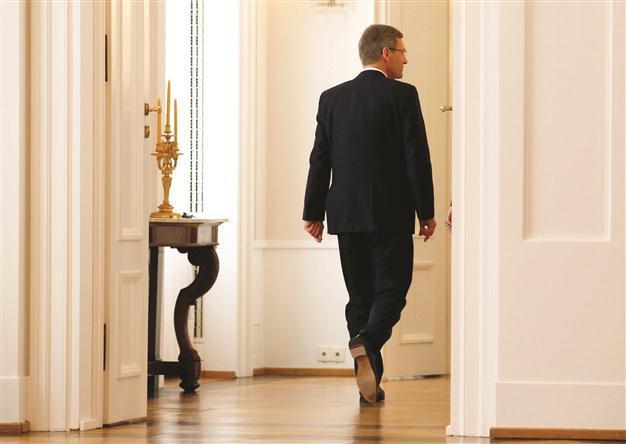Favors cost German president his post
BERLIN

Acknowledging that he lost the trust of the Germans, President Wulff says it is impossible to continue in a role that is meant to serve as a moral compass for the nation. AP photo
German President Christian Wulff resigned Feb. 17 in a scandal over favors he allegedly received before becoming head of state, creating a major domestic distraction for Chancellor Angela Merkel as she grapples with Europe’s debt crisis.Wulff announced his resignation a day after the slow-burning affair escalated dramatically with a request by prosecutors for the Bundestag, Germany’s Parliament, to lift his immunity from prosecution over his relationship with a film producer in his previous job as governor of Lower Saxony. Those benefits allegedly included paying for a luxury hotel stay in 2007.
Wulff said Germany needed “a president who is supported by the confidence not just of a majority of citizens, but a wide majority.”
“The developments of recent days and months have shown that this confidence, and therefore my ability to act, have been lastingly impaired,” a somber Wulff said in a brief statement at the president’s Bellevue palace, with his wife, Bettina, at his side.
Merkel: Deep regret
Merkel, who called off a trip to Rome to address the situation in Berlin, voiced “deep regret” at his resignation. She moved quickly to limit the fallout and try to ensure a smooth succession, saying she would seek an agreement with the main opposition parties on the next president. The resignation is likely to embolden the opposition Social Democrats (SPD) and Greens, who have shied away from criticizing Merkel too strongly in recent months.
Wulff is stepping down after less than two years in the job. He was Merkel’s candidate for the largely ceremonial presidency in 2010; before that, he was a deputy leader of her conservative party and the governor of Lower Saxony state. The speaker of the upper house of Parliament and a member of Merkel’s conservative bloc, Bavarian Minister-President Horst Seehofer, has taken over presidential duties on an interim basis.
A special parliamentary assembly made up of Bundestag lawmakers and representatives of Germany’s 16 states will have to elect a successor within 30 days. Merkel’s center-right coalition, which is prone to infighting, has only a wafer-thin majority in that assembly.
The chancellor quickly signaled that she did not want to risk failing to get a candidate elected, saying the governing parties would consult among themselves and then immediately approach the opposition Social Democrats and Greens. “We want to conduct talks with the aim, in this situation, of being able to propose a joint candidate for the election of the next German president,” Merkel told reporters.
It was not immediately obvious who might attract consensus support. Wulff emerged as president from a messy election in 2010 in which the opposition’s candidate, well-regarded former East German human rights activist Joachim Gauck, drew several votes from Merkel’s coalition.
‘To wulff’
The primary role of Germany’s president is to serve as a moral authority, and Wulff’s authority had already been eroded before prosecutors in Hannover, Lower Saxony’s capital, made their move Feb. 16. They asked for Parliament to lift Wulff’s immunity, an unprecedented move against a German president, saying there was “initial suspicion” that Wulff improperly accepted benefits from a German film producer friend, David Groenewold.
Wulff has long cultivated a schoolboy image, but his reputation took a hammering when daily Bild reported late last year that he had misled the state Parliament about a cheap 500,000-euro home loan from a businessman friend before becoming president.
Last month he admitted making a “grave mistake” by threatening the editor of top-selling Bild with “war” if he published the story about his private finance dealings. Since then, there has been a constant stream of new revelations that have chipped away at his credibility, leading the German media to mock him and even invent a new verb in his honor. “Wulffen” – or literally “to wulff” – means to be evasive without telling a clear lie.
On a trip to Rome earlier this week and in a briefing with a small group of journalists on Feb. 16, Wulff made clear he planned to hang onto his post. But the situation changed dramatically in the evening when state prosecutors in Hannover made their move. It is the first time ever that prosecutors have tried to investigate a German president and the move triggered direct calls from opposition parties for Wulff to go.
Wulff said in his resignation that he was convinced he would be fully cleared of any wrongdoing. “I have always behaved legally correctly in the offices I held,” he said. “I have made mistakes, but I was always honest.”
Compiled from AFP, AP and Reuters stories by the Daily News staff.
















